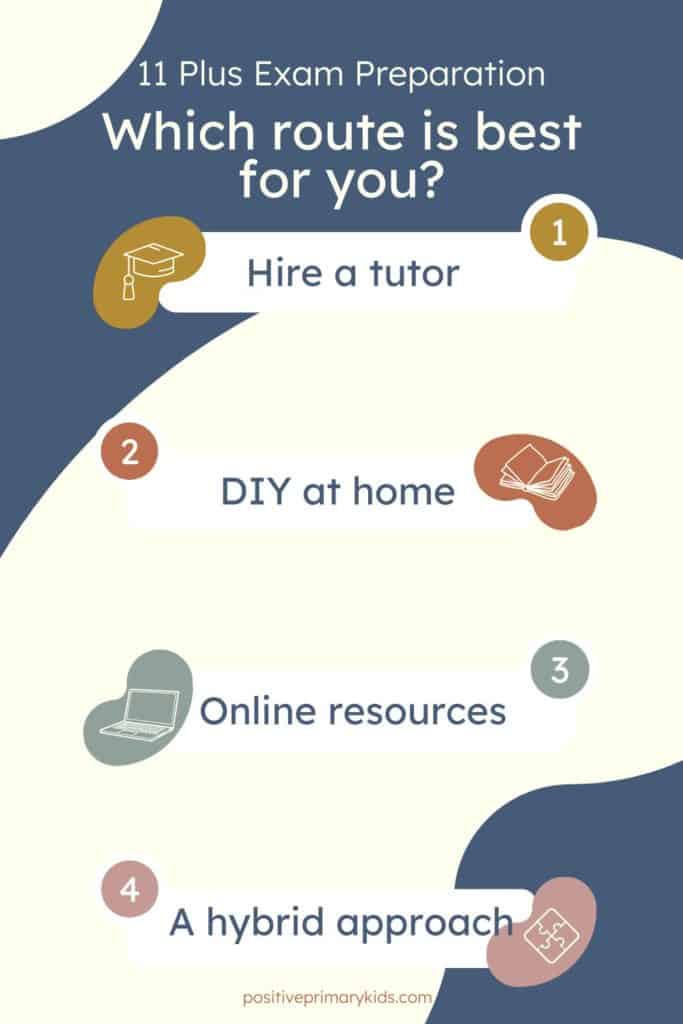So you’ve decided that you’d like your child to have a shot at getting into grammar school. You now have a big decision to make…
How are you going to get them ready for the 11 plus exam?
Perhaps you’ve begun looking for solutions and are becoming aware of the options.
Most parents in this situation are bursting with questions, like:
“Can I afford to hire a tutor for 11 plus preparation?”
“Do I have the skills and knowledge to teach my child myself?”
“Will my child cooperate with me as their tutor?”
In this post
- Look at the top two concerns that parents have when deciding whether to hire a tutor for 11 plus or do it themselves
- Compare the potential advantages and disadvantages of both routes
- Discuss other options that you may not have considered yet
Affiliate Disclosure: This post may contain affiliate links. This means that I may receive a small commision – at no cost to you – if you make a purchase through these links. Thank you for your support!
Financial Considerations
Hiring a tutor: The cost of hiring a private tutor can vary enormously. Qualifications, experience, location, demand and reputation can all play a part in fee structures.
Prices start from as low as £10 per hour with an inexperienced tutor, an A-level student or possibly for group lessons. At the other end of the spectrum, you could spend more than £200 per hour (ouch!). If you book through an agency, you may pay even more due to additional agency fees.
Paying a lot doesn’t guarantee the suitability of a tutor for your child’s needs or their results. However, I would advise caution around inexperienced tutors with very low rates.
DIY prep: Taking on 11 plus preparation yourself will almost definitely be cheaper than if you hire a tutor. But it can still vary from virtually nothing to hundreds of pounds.
Generally, DIY prep involves buying a set of resources – books, practice papers, online resources – and working through them with your child. Most 11 plus books are good value for money costing around £6.95 to £16.95 each. For each subject, the minimum you are likely to need is:
- A parents guidebook/handbook
- Practice books, starting at your child’s level of understanding (these aren’t necessarily books matching their age or school year) then progressing up to exam expectations level (to the end of the year 6 curriculum in maths and English)
- Short, timed test practice
- Realistic test practice
A couple of points to consider that will affect how much you end up spending on resources include:
- Kids engage with some resources better than others, so it’s worth ‘testing’ material from different publishers before paying for whole sets that bore them.
- Do a baseline assessment before buying workbooks so that you don’t waste money on too easy or too difficult material. You can find these in most guidebooks, like these from CGP and Bond.
Not sure what to expect? This post explains everything and links to other helpful posts on this topic:

Existing Commitments and Time Constraints
Hiring a tutor: Your time is valuable. If you are already up to the eyeballs in work, domestic tasks, ferrying kids to various activities and struggling to find any downtime for yourself, hiring a private tutor is probably your best choice.
A good tutor will take care of planning, preparation and using suitable resources, which is a massive time saver for you. Also, your presence is unlikely to be required during the time that your child spends with their tutor.
The amount of time that you save depends on the type of tuition that your choose. If the tutor comes to your home you can get on with other things during the lesson. Travelling to and from a tutor’s workplace can eat into your time, especially if you have to wait around to collect them. If you choose to work with an online tutor like me, you won’t even have any travel time!
It’s important to be aware that hiring a tutor does not remove the need for parent involvement. Daily reading and homework tasks will need to be completed.
DIY prep: Do you have enough free time to research, plan and support learning?
If you aren’t familiar with a topic, it can take a lot of time to understand it yourself before you work with your child. Verbal and non-verbal reasoning can be especially difficult to teach if you aren’t familiar with them.
Planning time is important too. You need to have a clear route to follow and keep you on track.
Although you won’t need to sit with them the whole time, you do need to be available to provide support for study sessions.
DIY prep can be a great option if your commitments change from week to week and you need the flexibility to fit lessons in when you can.
Other Important Things to Consider When Deciding to Hire a Tutor for 11 Plus or do DIY prep
Hiring a Tutor – Pros
✅ Tutors should have a wide range of teaching methods to keep learning engaging and effective
✅ Learning will be personalised because experienced tutors usually have carefully curated resources for children at all stages
✅ Tutors with 11 plus experience can assess a child’s potential more objectively than parents
✅ Children often focus better and put effort into the work that they do with a tutor than with a family member
✅ There are fewer distractions and time-wasting occurs less often during dedicated tutor-time
Hiring a Tutor – Cons
☹️ You may become out of the loop with what your child is learning as well as what they are doing well with and tricky areas that need more attention
☹️ A tutor’s fixed time slot for lessons might not work with your schedule
☹️ Some children don’t ‘click’ with their tutor and may not be a good fit for each other
☹️ Finding the right tutor for your needs can be difficult and time-consuming
DIY prep – Pros
✅ It’s great for parents to have an insight into their child’s learning
✅ Some parents find that teaching their child is easy and that preparation doesn’t take them long at all (tip: make sure that you buy practice materials that include answers)
✅ You will develop skills and knowledge alongside your child
✅ The process of working together can be a really special bonding experience and bring you closer…
DIY prep – Cons
☹️ …or, they may refuse to lift a finger if you are teaching!
☹️ It is difficult for parents to have a realistic, objective view of their child’s potential or suitability for the exams
☹️ Many parents struggle with a lack of guidance and not knowing if they are on the right track. This can cause overwhelm and stress, which children pick up on
☹️ Kids can be easily distracted when learning at home with their parents. They may want to hurry to continue watching something on YouTube or run to the kitchen for a snack – or countless other diversion tactics! Noise from other family members can be a distraction too
☹️ DIY prep can cause tension and conflict. It’s easy to fall into a pattern of nagging which then leads to resentment and reluctance to do any learning
What about other options?
A lot of families find that the route that is best for them uses a combination of approaches. Some families hire a tutor for some subjects and cover others themselves. Others might do DIY prep during year 4 and then work with a tutor throughout year 5.
As well as DIY and tuition, other options that might work for you include:
- Tuition Centres – These can be an affordable option, but choose carefully. Chains of tuition centres tend to lack the personalisation and individual support that kids need for 11 plus success. Independently owned and operated centres can be very good.
- Holiday Courses – Courses held during school holidays are a popular choice – especially summer courses. These tend to be well structured and are great for revision.
- Group Tuition – Groups are great for kids who benefit from the momentum and often competitive nature of working with peers. Groups are usually less tailored to each child’s needs.
- Online Courses – Options for online courses range from low to high cost and vary in structure, content and quality. There are plenty to choose from if this is a route that interests you. Some are short, revision-type courses whilst others are more comprehensive.
- Downloadable or Online Materials – There’s a wide range of resources available for quick access online, such as these free familiarisation tests which you can print off at home for realistic test practice. Some sites offer free and paid-for options for downloading, printing and practising at home.
So, is it smarter to hire a tutor for 11 Plus or do DIY prep?
This is a question only you can answer. Every family is different your child has unique needs.
There are certainly pros and cons to both. Yes, tuition can get expensive, but a good tutor will make the journey much easier for you. DIY preparation gives you the potential to save money, but that could come at the cost of stress, tension and loss of free time.
Plenty of families are successful with DIY 11 plus prep, but it isn’t the right choice for everyone. There’s no right or wrong approach. Think about what suits you best and be prepared to make changes if your original route isn’t working.
I usually recommend a mixed approach to most families. If you have the money, time and desire to do so, combining DIY prep with hiring a tutor and using a variety of resources is a sensible and balanced way to prepare for the exams.
Are you 'team DIY' or 'team tutor'?
If you are on an 11 plus journey, which route are your taking?
Let me know in the comments below!









0 Comments